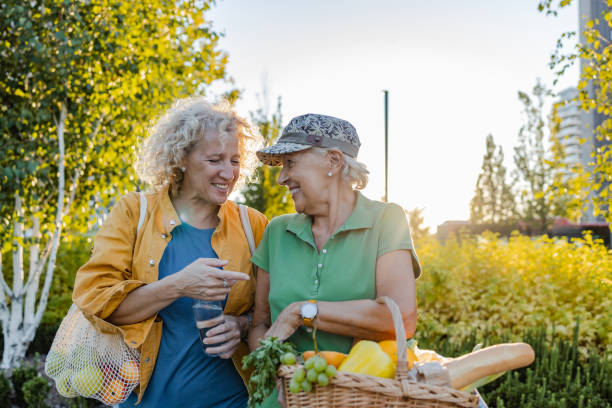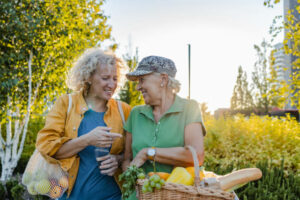
Harmful Myths and Stereotypes About Older Women Versus the Real Truth
“Myths are public dreams, dreams are private myths.”—Joseph Campbell.
What is myth?
“A widely held but false belief or idea.”—Oxford Languages
According to Oxford Languages, other popular terms for myth are misconception, fallacy, mistaken belief, false notion, and misbelief.
Myths are stories that create stereotypes.
Stereotypes are only valid if we allow them to affect the way we live.
Example: Older women are content to stay home, chat with friends, shop online, and watch soap operas on TV.
Does it not anger you to hear that many consider older women irrelevant, unmotivated, and unimportant?!?
How dare they!!!
Yes, such beliefs get me riled up!
Have you heard the stories about Betty White (who died at 99), Cicely Tyson (who died at 96), Ruth Bader Ginsburg (who died at 86), and Maya Angelou (who died at 86)? These women had long, fascinating lives!
They were old but not “old.”
And they made a difference in their chosen fields and should be celebrated.
What myths have you heard about older women?
In this article, I will discuss several harmful Myths and stereotypes about mature women that are not true.
Here they are.
Myth: Lack of Desirability
One common myth is that older women are less desirable or attractive compared to younger women.
The Real Truth:
Attractiveness is subjective and found at any age.
Beyond physical attractiveness, many find attributes such as intelligence, confidence, kindness, and a sense of humor appealing to a woman of any age.
Some other commonly cited reasons why some individuals find older women attractive:
- Maturity: With age often comes wisdom and maturity. Older women may better understand themselves and what they want from life and relationships.
- Life experience: Older women have had more time to experience life, learn from their mistakes, and grow as individuals.
- Independence: Many older women have established careers, friendships, and interests outside their romantic relationships, which can be attractive to those who value freedom and autonomy.
- Emotional stability: Older women may be more emotionally stable and less likely to engage in drama or games in relationships.
- Physical attraction: Some people are attracted to the physical features that often come with age, such as lines or wrinkles indicating a well-lived life.
It’s important to remember that these are generalizations; not everyone will be attracted to the same qualities in older women.
Attraction is complex and multifaceted, and what one person finds attractive, another may not.
Myth: Technological Ineptitude
Another myth is that older women must be more adept at using technology.
The Real Truth
The truth about older women and technology is multifaceted and nuanced.
While there may be stereotypes suggesting that older women are less adept with technology than younger generations, this is not universally true.
Though some may have a learning curve, many older women are quite proficient with technology and use it daily.
Consider these facts:
- Diverse Skill Levels: Older women exhibit various technological skills and comfort levels like any demographic group. Some may be very proficient with technology, while others may be less. Age alone is not a determining factor in one’s ability to adapt to and use technology.
- Barriers to Access: Older women may face barriers to accessing and adopting technology, including lack of exposure, limited resources, or technological literacy. These barriers are compounded by socioeconomic status, education level, and geographic location.
- Learning and Adaptation: Many older women are eager to learn and adapt to new technologies. With user-friendly devices, online tutorials, and community classes, individuals of all ages can acquire new skills and become comfortable with technology over time.
- Technology as Empowerment: For some older women, technology serves as a means of empowerment, enabling them to stay connected with loved ones, access information and services, pursue hobbies, and even engage in activism or advocacy efforts.
- Design Considerations: Developers and designers have recognized the importance of creating technology that is accessible and user-friendly for individuals of all ages and abilities. Efforts to improve the design of software, websites, and devices can enhance the digital experience for older women and other users.
- Interpersonal Support: Peer-to-peer support networks and intergenerational relationships can play a crucial role in helping older women navigate technology. Family members, friends, and communication organizations can offer guidance and assistance as needed.
- Continued Relevance: As technology becomes increasingly integrated into various aspects of daily life, using digital tools effectively is essential for people of all ages. Older women are actively participating in this digital landscape, whether it’s through social media, online shopping, telehealth services, or other digital platforms.
In summary, while there may be challenges and stereotypes surrounding older women and technology, it’s essential to recognize the diversity of experiences within this demographic group. With support, education, and user-friendly technology, older women can harness the benefits of the digital age and continue to engage in technology.
Myth: Dependence on Others
There is a misconception that older women are more dependent on others, particularly financially, and less independent than younger women.
The Real Truth:
Many older women are financially stable and independent.
“There are about 22 million households in the United States with a net worth of $ 1 million or more; a third of these are headed by women, most of whom reach that milestone by age 58.”
(Source: Yahoo! Finance)
However, becoming a widow can increase an older woman’s chance of becoming economically insecure.
However, being financially insecure later in life does not have to be the case.
It is all about mindset during the early years.
Critical Aspects of a Positive Financial Mindset for Women:
- Education and Knowledge: Women should actively seek to educate themselves about personal finance, including budgeting, saving, investing, and managing debt. Knowledge is empowering and can help women make informed money decisions.
- Long-Term Planning: Women must adopt a long-term perspective about finances, which includes setting clear financial goals, such as saving for retirement, buying a home, starting a business, and developing a plan to achieve those goals over time.
- Confidence in Managing Money: Women should have confidence in their ability to manage money effectively, which involves overcoming feelings of insecurity or self-doubt about financial matters and taking proactive steps to improve their skills.
- Financial Resilience: Women should strive to build financial resilience, which means the ability to withstand financial setbacks or unexpected expenses without experiencing significant hardship, which involves building an emergency fund, having adequate insurance coverage, and diversifying income streams.
- Seeking Support and Advice: Women should feel comfortable seeking support and advice from trusted sources, such as financial advisors, mentors, or support groups. Asking for help when needed can provide valuable guidance and perspective on financial decisions.
- Overcoming Gender Bias: Women may encounter gender bias in the financial industry. It’s important to challenge stereotypes and advocate for gender equality in all aspects of finance, including equal pay, access to credit, and representation in leadership positions.
Overall, the mindset women should have about finances is empowerment, knowledge, and confidence, allowing them to take control of their financial future and achieve their goals.
You will also enjoy the article “Women Put Yourself First in Planning for Financial Freedom in Retirement,” which stresses the importance of your future investing.
Myth: Invisibility
There’s a myth that older women become invisible as they age, particularly in media and society.
The Real Truth:
Though ageism is alive and well, older women continue to make significant contributions in various fields in society, but many do not feel represented in the media.
Senior women often feel overlooked.
“Women older than 50 are underrepresented on U.S. television in 2021 garnering just 8% of screentime, despite representing 20% of the population, according to Nielsen.”
(Source: Generations: American Society on Aging)
Examples of Older Women Making a Difference in 2024:
Kamala Harris (59), U.S. Vice President
Nikki Haley (52), U.S. Republican Presidential Candidate and former governor of South Carolina
Ursula Von der Leyen (65), President of the European Commission
Dr. Gloria Bonilla-Santiago (63), Founder of LEAP
Kathy Tillotson (64), Founder of Build Futures, an organization that finds permanent housing for homeless children
Diane Latiker (60), Founder of Kids off the Block, an organization that helps at-risk youth
Melanie Garland, (50+) “Senior Runner,” Welsh Master Athlete
As you can see, another myth busted that older women become invisible as they age.
Far from it!
Myth: Health and Vitality
Some assume older women are less healthy and energetic than younger women.
The Real Truth
While aging may bring certain health challenges, many older women maintain active lifestyles and prioritize well-being.
Physical activity and health vary among people of all ages.
Many 55+ women prioritize regular exercise, watching what they eat, and seeing their physicians regularly or as needed for preventative healthcare and maintaining their overall well-being.
Mature women do not take risks when caring for physical, mental, and emotional health.
Here are some views that many older women share:
- Importance of Health: Many older women recognize the importance of physical activity for maintaining good health and overall well-being. They may engage in physical activity to prevent or manage chronic conditions such as heart disease, diabetes, or osteoporosis.
- Independence and Mobility: Maintaining independence and mobility is often a priority for older women. Regular physical activity can help them stay mobile, agile, and able to perform daily tasks without assistance for as long as possible.
- Social Connection: For some older women, engaging in physical activity provides an opportunity for social interaction and connection, which could be through group exercise classes, walking groups, or sports teams, fostering a community and camaraderie.
- Mental Well-being: Physical activity is not only beneficial for physical health but also for mental well-being. Many older women find that exercise helps reduce stress and improve and enhance cognitive function, contributing to a better quality of life.
- Body Image and Confidence: Some older women may experience changes in body image as they age, which can affect their attitudes toward physical activity. Encouraging a positive body image and promoting activities focused on strength, flexibility, and overall well-being rather than appearance can help with these concerns.
So, there you have it!
The myths discussed in this article are harmful as they perpetuate stereotypes and undermine the diverse experiences and capabilities of older women.
Challenging these misconceptions and recognizing the value and contributions of women of all ages is essential.
Exposing the Real Truth about older women revealed in this article will continue to destroy the many harmful stereotypes and portray women of various ages authentically.
Also, the National Council on Aging (NCOA.gov) is an excellent resource for more information on this topic.
This article has exposed some of the fallacies—the myths—about aging women.
***** *****
If you are an older woman reading this article, I want you to go out there and become a myth-buster!
Begin today!
Start right now!!!
Key Takeaways
- What is myth?
- The “real truth” about desirability.
- The truth about older women and technology is that it is multifaceted.
- The truth is that older women are financially stable and independent.
- Why do older women feel overlooked?
- How senior women maintain active and healthy lifestyles and prioritize well-being
“Older women know who they are, making them more beautiful than younger ones. I like to see a face with some character. I want to see some lines. I want to see some wrinkles.”—Naveem Andrews.




